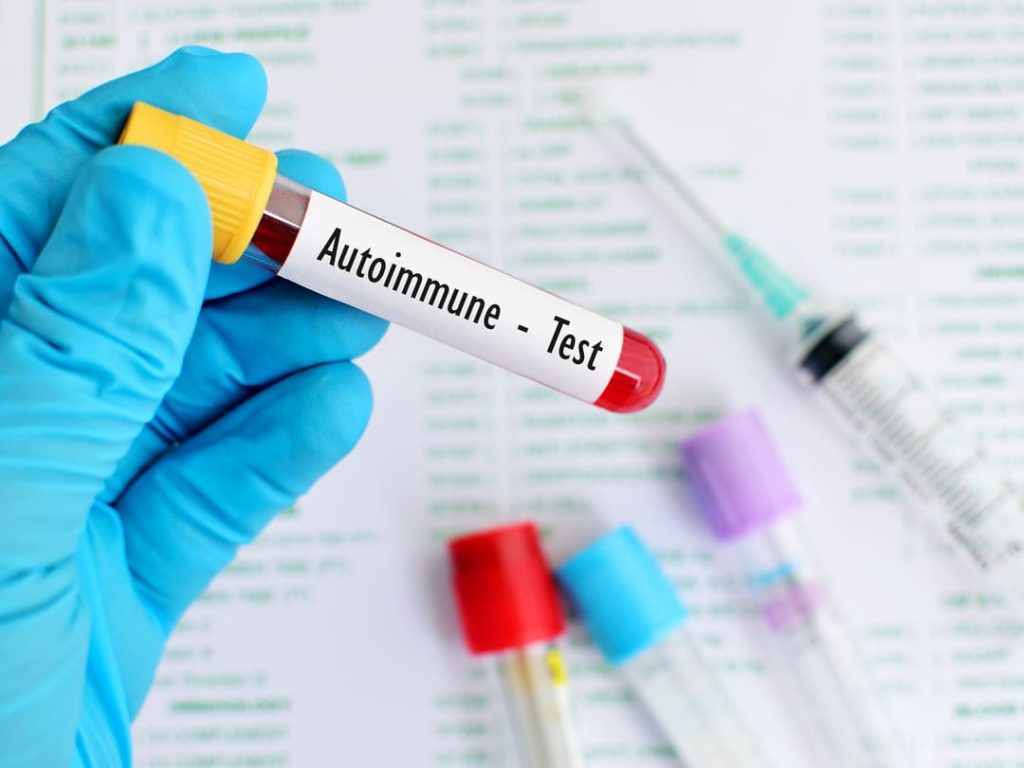Looking for Expert-Level VA Claim Answers?📱Call Us Now! 737-295-2226
Living with an autoimmune disease can affect not only your health but also your ability to work and carry out daily activities.
In this post, we’ll explore how you can get a VA disability rating for autoimmune diseases.
We’ll also zoom in on the VA rating process, eligibility criteria, and specific VA ratings for common autoimmune conditions like:
- Sjogren’s syndrome
- Lupus
- Hashimoto’s disease
- Myasthenia gravis, and
- Scleroderma
Let’s take a look.
- What is an Autoimmune Disease?
- VA Disability Ratings for Autoimmune Diseases
- Common Autoimmune Disease VA Ratings
- How to Service Connect Your Autoimmune Disease
- C&P Exams Related to Autoimmune Diseases
- VA Disability Rating for Autoimmune Disease (FAQs) Frequently Asked Questions
- Does PTSD Increase the Risk of an Autoimmune Disorder?
- Can Gulf War Syndrome Increase the Risk of Other Autoimmune Disorders?
- Are Infectious Diseases and Autoimmune Disorders Eligible for VA Disability?
- My infectious disease wasn’t diagnosed until after I was discharged. Can I qualify for VA disability?
- How do I apply to receive my VA ratings?
- How long does it take to receive my VA disability benefits?
- How are VA rating percentages assigned to my conditions?
- My condition has worsened. How do I increase my VA rating?
- NEED MORE ASSISTANCE?

What is an Autoimmune Disease?
Autoimmune disease is a term that covers at least 80 different known conditions.
An autoimmune disease or autoimmune disorder occurs when the immune system is unable to distinguish between foreign invaders and healthy tissue. This causes the body to produce antibodies that destroy the body’s own tissue instead of the infection.
Some of the most commonly-recognized autoimmune diseases include:
- Lupus
- Rheumatoid arthritis
- Ulcerative colitis
- Crohn’s disease
- Celiac disease
- Psoriasis
Autoimmune diseases can cause debilitating effects and pose challenges for diagnosis due to their broad range of symptoms.
These symptoms can include:
- Fatigue
- Chronic joint pain
- Digestive issues
- Muscle weakness
- Inflamed skin
- Hair loss
- Chronic, unspecified pain
Additionally, it’s important to recognize that each autoimmune disease is distinct, and symptoms can vary based on the specific condition.
You DESERVE a HIGHER VA rating.
Take advantage of a VA Claim Discovery Call with an experienced Team Member. Learn what you’ve been missing so you can FINALLY get the disability rating and compensation you’ve earned for your service.
VA Disability Ratings for Autoimmune Diseases
The VA assigns disability ratings based on the severity of your symptoms and their impact on your daily life.
Autoimmune disease ratings range from 0% to 100% in 10% increments.
For autoimmune diseases, the rating will depend on various factors, including:
- Diagnosis: The specific autoimmune disease you have and its severity.
- Symptoms: The frequency and intensity of your symptoms, such as pain, fatigue, and functional limitations.
- Treatment: The effectiveness of your treatment plan and any side effects you experience.
- Medical evidence: Comprehensive medical records documenting your diagnosis, treatment, and ongoing struggles.
Common Autoimmune Disease VA Ratings
Some of the most common autoimmune diseases affecting veterans include Sjogren’s Syndrome, Lupus, Hashimoto’s disease, Myasthenia gravis, and Scleroderma. Let’s take a close look at these conditions.
Sjogren’s syndrome
Sjogren’s syndrome Sjogren’s Syndrome is an autoimmune condition where the glands producing tears and saliva are destroyed.
It is commonly associated with rheumatoid arthritis and is rated under diagnostic code 5002 for systemic arthritis.
However, VA disability for Sjogren’s syndrome can also be rated based on the severity of symptoms it causes in the eyes or throat.
Lupus
Lupus can cause inflammation and damage to various organs and tissues in the body. Lupus is evaluated by the VA using Diagnostic Code 6350, with ratings available at three levels: 100%, 60%, and 10%.
To qualify for a 100% lupus VA disability rating, veterans must experience frequent exacerbations leading to severe impairment of health.
A 60% rating is granted for exacerbations lasting a week or more, occurring 2 or 3 times per year.
For a 10% VA rating, veterans must have exacerbations once or twice a year or have had symptoms within the past two years.
Hashimoto’s Thyroiditis
Hashimoto’s disease, a thyroid disorder resulting from autoimmune inflammation, can lead to hypothyroidism and associated symptoms such as fatigue and weight gain.
VA disability ratings for Hashimoto’s disease consider thyroid function tests, symptoms, and treatment requirements to determine eligibility for benefits.
Hashimoto’s VA rating can range from 30% to 100%, depending on the severity of symptoms and treatment requirements under Diagnostic Code 7903 (hypothyroidism).
Myasthenia Gravis
Myasthenia gravis is a neuromuscular disorder characterized by muscle weakness and fatigue, often exacerbated by activity.
Myasthenia gravis diagnostic code 8025 only has a minimum rating of 30%.
Myasthenia gravis VA ratings are based on the severity of muscle weakness, respiratory impairment, and the need for medication or other treatments.
Scleroderma
Scleroderma, a rare autoimmune disease, causes hardening and tightening of the skin and connective tissues. Scleroderma VA ratings can range from 0% to 60%, depending on the extent of skin involvement and organ involvement.
VA disability ratings for scleroderma evaluate the extent of skin involvement, internal organ complications, and functional impairment when assigning benefits. It is usually rated under diagnostic code 7821. This DC uses the general rating formula for skin conditions.
How to Service Connect Your Autoimmune Disease
To receive a VA rating for Autoimmune Disease, you must first establish a service connection.
This is when you’re able to prove that something that happened during and because of your military service caused your condition or made it worse.
Service connection consists of three essential elements, known as the Caluza Triangle:
- A current medical diagnosis. The VA can’t rate a condition that hasn’t been formally diagnosed.
- Evidence of an in-service event, injury, disease, or aggravation. This evidence can include service records, military medical records, or lay statements from people who witnessed the event, injury, or illness.
- A “nexus” (or link) between #1 and #2 via competent medical evidence. If you decide to get a nexus letter, it should include one of these statements:
- “Is due to” = 100% certain
- “More likely than not” = greater than 50% certain
- “At least as likely as not” = equal to 50% certain
- “Not likely due to” = less than 50% certain
- “Is not due to” = 0% chance
C&P Exams Related to Autoimmune Diseases
After you file a VA claim for your Autoimmune Diseases, the VA might request a Compensation and Pension exam (C&P exam).
This request can come through a call, a letter, or an email from the VA.
PRO TIP: It’s important to go to your C&P exam, as missing it could lead to a VA claim denial.
The C&P exam is generally conducted by a VA or VA-contracted physician.
Prior to the exam, the examiner will review your C-file, which contains all previously submitted documentation, medical records, and military service history.
Your C&P Exam is one of the most important steps in the VA claims process. When the VA is determining if your condition is service-connected and what rating it could warrant, it places a lot of weight on the results of the exam as well as the examining physician’s notes.

VA Disability Rating for Autoimmune Disease (FAQs) Frequently Asked Questions
Does PTSD Increase the Risk of an Autoimmune Disorder?
VA researchers have discovered a link between autoimmune disorders and post-traumatic stress disorder (PTSD). They found that though PTSD is not the cause of autoimmune disorders, veterans with this mental health condition are more likely to develop an autoimmune disorder. The connection between the two remains unknown.
Researchers hypothesize it could be due to environmental factors, bad habits developed due to the onset of PTSD, or changes in the immune system or hormones due to the mental condition.
Can Gulf War Syndrome Increase the Risk of Other Autoimmune Disorders?
Gulf War syndrome is an autoimmune illness impacting veterans who served in the Middle Eastern conflict in the early 1990s. Studies have been ongoing because the condition was widely unknown and unexplained when it began emerging in soldiers.
Gulf War syndrome is considered part of the VA infectious diseases and autoimmune disorders for the purpose of benefits. Gulf War syndrome doesn’t necessarily increase the chances of developing other autoimmune disorders, but it does include a range of autoimmune illnesses. (For example, chronic fatigue syndrome is a common symptom of Gulf War syndrome).
Are Infectious Diseases and Autoimmune Disorders Eligible for VA Disability?
Yes, Infectious diseases and autoimmune disorders can be eligible for VA disability benefits. However, the VA does not determine eligibility based on the type of medical condition only, many factors go into deciding if you can receive VA disability benefits or not.
To be eligible for benefits, the VA requires that:
- You must currently be sick or suffering from the condition when you apply.
- You have qualifying service within the military, including inactive and active duty training or active duty service.
- You have proof that your illness either started during your time in the military or was aggravated by your military service.
My infectious disease wasn’t diagnosed until after I was discharged. Can I qualify for VA disability?
Since active infections are acute conditions, they would have to be diagnosed close to the discharge date in order for them to be related to your military service. It has to be clear that the incubation period most likely began while on active duty.
How do I apply to receive my VA ratings?
If you are still in the military, then you can request your military physician to refer you to the MEB and start the IDES process. If you are already a veteran, you can submit a VA Disability Claim along with evidence of service connection and all medical records regarding the conditions on the claim.
How long does it take to receive my VA disability benefits?
Brand new claims usually take 3-6 months to process. Once processed, you will start receiving payments in 1- 2 months.
How are VA rating percentages assigned to my conditions?
The rules of the VA’s Schedule for Rating Disabilities (VASRD) are used to assign rating percentages to conditions. The VASRD gives rating rules for conditions based on their symptoms, treatment options, and the resulting level of disability they cause.
My condition has worsened. How do I increase my VA rating?
If your conditions have worsened since you last applied and now qualify for a higher VA rating, you can submit a new claim, checking the box for an increased evaluation.

NEED MORE ASSISTANCE?
Most veterans are underrated for their disabilities and, therefore, not getting their due compensation.
At VA Claims Insider, we help you understand and take control of the claims process so you can get the rating and compensation you’re owed by law.
Our process takes the guesswork out of filing a VA disability claim and supports you every step of the way in building a fully developed claim (FDC)—so you can increase your rating FAST!
If you’ve filed your VA disability claim and have been denied or have received a low rating—or you’re unsure how to get started—reach out to us! Take advantage of a FREE VA Claim Discovery Call.
Learn what you’ve been missing—so you can FINALLY get the disability rating and compensation YOU DESERVE!

Asaad Fakhir
A former US Army translator in Iraq (2006-2009) and an ex-commissioned Iraqi officer, Asaad graduated from the Royal Australian Military College (2010-2014). Asaad holds a Bachelor’s degree in English Arts and currently serves as a content writer at VACI, leveraging military experience with linguistic skills to create impactful content.



